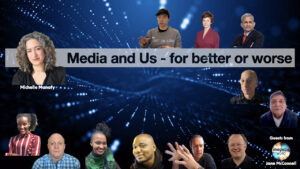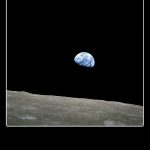The Media and Us – for better or worse

A theme-based article from Imaginize.World guests about the media. Inspired by my conversation with Michelle Manafy and expanded by other Imaginize.World guests.
Michelle’s views as a media professional are developed into a fascinating big picture with details from 11 people around the world based in different countries with diferent focal points and experiences.
We need a renewed whole earth perspective
 The whole earth vision has been lost. We no longer live (if we ever did) in a world where humans live in harmony with other species in the biosphere and all have access to what we need to live healthy, safe and purposeful lives. Perhaps this can be achieved by a civil, global movement from the bottom-up.
The whole earth vision has been lost. We no longer live (if we ever did) in a world where humans live in harmony with other species in the biosphere and all have access to what we need to live healthy, safe and purposeful lives. Perhaps this can be achieved by a civil, global movement from the bottom-up.
Education tomorrow, beyond time and place
 Education will be radically different than it is today: more reactive, flexible and customized for people. It will go beyond the classroom, beyond books. We talk about real cases that will inspire new opportunities .“Education will become the largest single industry and entertainment a close second-or mankind would die of utter boredom in a workless world.” Arthur C. Clarke. Workless or not, education is evolving fast and opening new opportunities.
Education will be radically different than it is today: more reactive, flexible and customized for people. It will go beyond the classroom, beyond books. We talk about real cases that will inspire new opportunities .“Education will become the largest single industry and entertainment a close second-or mankind would die of utter boredom in a workless world.” Arthur C. Clarke. Workless or not, education is evolving fast and opening new opportunities.
A jobless future or a new workworld?
 Will jobs and employment decrease significantly because of AI and automation, or will new industries offer more opportunities? Jobs just to keep busy? The job saviors industry. Going rogue. The difference between work and play. Or are they the same?
Will jobs and employment decrease significantly because of AI and automation, or will new industries offer more opportunities? Jobs just to keep busy? The job saviors industry. Going rogue. The difference between work and play. Or are they the same?
Are we losing trust in science?
 Scientists play a critical role in advancing knowledge. However, public trust is often not the case. In the past, Galileo and Darwin were considered threats to society. And today? Kim Stanley Robinson in Red Mars and Sequoia Nagamatsu in “30,000 Years beneath a Eulogy” offer new perspectives, as do people from the Future 2043 survey who describe scientists in the future as explorers, rock stars and change agents.
Scientists play a critical role in advancing knowledge. However, public trust is often not the case. In the past, Galileo and Darwin were considered threats to society. And today? Kim Stanley Robinson in Red Mars and Sequoia Nagamatsu in “30,000 Years beneath a Eulogy” offer new perspectives, as do people from the Future 2043 survey who describe scientists in the future as explorers, rock stars and change agents.
What will people believe in 20 years from now?
 Three perspectives: believing what we see, believing what has actually happened, and believing we can make a difference. Will our belief systems be less relevant. Are they necessary for humanity. Will they unite us or continue to create conflicts. Will influencers and politicians be our new religious leaders.
Three perspectives: believing what we see, believing what has actually happened, and believing we can make a difference. Will our belief systems be less relevant. Are they necessary for humanity. Will they unite us or continue to create conflicts. Will influencers and politicians be our new religious leaders.
Are cities key to human survival?
 Interconnections between cities and humanity in a world where cities are getting bigger. Are cities our hope for survival as hubs for innovation and services for people? There are three movements on-going: vertical expansion, horizontal sprawl in the shape of formal suburbs and informal slums, and simply leaving.
Interconnections between cities and humanity in a world where cities are getting bigger. Are cities our hope for survival as hubs for innovation and services for people? There are three movements on-going: vertical expansion, horizontal sprawl in the shape of formal suburbs and informal slums, and simply leaving.
Networks of healthier cities
 Large cities may be turning into networks of citified villages. A catastrophe could lead us to rebuilding cities (and our civilization) into new ways of living, even a return to the distant past. Or, we could develop our cities today in ways that make them more human and healthier. Does earth abide?
Large cities may be turning into networks of citified villages. A catastrophe could lead us to rebuilding cities (and our civilization) into new ways of living, even a return to the distant past. Or, we could develop our cities today in ways that make them more human and healthier. Does earth abide?
